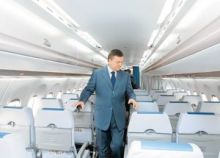It looks like the final decision of the Ukrainian government to put the former prime minister Yulia Tymoshenko into prison will seriously change the foreign policy of Ukraine. It is known that Viktor Yanukovych is not going to Brussels tomorrow where he was supposed to finalize the Association Agreement that Kyiv was going to sign in December during the summit Ukraine-EU. In his interview to the Western media Viktor Yanukovych clamed that Ukraine is ready to postpone signing of the Association Agreement if it does not comprise the membership prospects: “If Europe is not ready for this or Ukraine is not ready this decision can be made later.” Moreover, the president made it clear that he considers Yulia Tymoshenko’s discharge unacceptable: “What message will we send accross? That one needs to be in opposition to commit a crime?”
Many experts and politicians predicted that after the verdict for the leader of the opposition the government would climb down under the pressure of the Ukrainian and world community but their predictions were not realized. As political expert Mykhailo Pohrebynsky remarked, “EU did not consider Yanukovych’s psychology.” There was a moment when it seemed that the government would go back on its tracks. The president even conceded that the appeal trial could happen with the account of decriminalized articles Tymoshenko had been charged with. However, the peremptory declarations of the European elite that put the question point-blank provoked the inverse reaction of Yanukovych and his team. However, what did the Ukrainian authorities hope for when they accused Tymoshenko? Europe has repeatedly made it clear that it will not exchange its values for economic goods. What is more, the dependence of the country on the “president’s psychology” can lead to unpredictable results.
Drifting apart from Brussels we automatically drive ourselves into the open arms of Russia and Belarus. We have repeatedly refused to joint the Customs Union but now it turned out that Ukraine can consider this option. “If the European Union clearly says ‘no’ there is a strong probability that we focus on the Customs Union. The people who want to see Ukraine in the Customs Union might get a very serious argument in support of the thesis that we have to entre this union”, Vice Premier and Minister for Social Policy Serhii Tihipko said in his interview to The Day.
We asked our readers the question on our web-site: what does the prospective of Ukraine to enter the Customs Union mean for you? The answers are the following: failure of all the hopes for the European integration – 24.32 percent; reason for a new “maidan” – 18.92 percent; reason for immigration – 13.51 percent; new advantageous place of Ukraine at the international arena – 27.03 percent; it means nothing since nothing worse will happen – 16.22 p percent. As we can see, only a quarter of voters are positive about the Customs Union.
Meanwhile, Russia continues inclining Ukraine towards its integration unions. The other day in his interview to three federal channels – Rossiya, Pervy and NTV the Russian Prime Minister Vladimir Putin emphasized: “It was in 2002 if my memory does not fail me… Nazarbayev, Lukashenko, the then Ukrainian president Kuchma and I… I suggested waiting for him; we did it and talked in four. So, one does not need to be an expert to understand that if we combine our possibilities – technologies, infrastructure, transport, energy, mineral resources, manpower, territory and even languages that are also very important for the general economy development – if we put all these things together our competitiveness will significantly grow. Significantly grow!”
Probably, this issue will be discussed at today’s meeting of Vladimir Putin and Mykola Azarov in St. Petersburg within the framework of the CIS heads of governments meeting. For the time being the President Viktor Yanukovych says that the cooperation between Ukraine and Russia has reached an absolutely new level. He clamed it yesterday during the 2nd International Ukrainian-Russian Economic Forum in Donetsk. The president also expressed hope that in the nearest future the bilateral trade between the two countries will exceed 50 billion dollars. In his turn, the Russian President Dmitry Medvedev present at the forum emphasized: “The Russian-Ukrainian relations should not be reduced to the gas price talks and discussion how to develop such an important cooperation direction as the energetic one. We have other values that we can simultaneously dispose and develop.”
After Viktor Yanukovych won the presidential elections and especially after the nonaligned status of Ukraine was legally fixed many started speculating about the so-called multivectoral policy of Leonid Kuchma’s times. It was characterized by the improvement of relations with Russia in case of worsening of the relations with the West. And vice versa: if relations with the eastern neighbor worsened Ukraine dramatically focused on the European and Atlantic integration. This policy did no have any results; it only preserved the clan-oligarchic system in Ukraine. Everybody remembers how it finished in 2004. The current situation in the foreign policy reminds the one of Kuchma’s rule a lot. Of course, it is difficult to predict the results of cooling down in relations with the West and warming in relations with Russia, however, the recent history shows that our neighbors will benefit from this policy and Ukraine will lose.
COMMENTARY
“Yanukovych is as much likely to come into conflict with Russia as he is with Europe “
Alexander RAHR, director, Russia-Eurasia Program, German Council on Foreign Relations:
“It seems to me relations with Ukraine are entering a new phase, as the European Union has increased pressure. At first Ukraine was just reminded that it should be a rule-of-law state and strive to have more, not less, democracy, and that there was a fear that it was straying from a democratic path. In particular, the West cited the Tymoshenko case. Westerners did not seriously expect her to be sentenced to seven years in prison and then stand a new, more serious, trial.
“People in the West, in Brussels and other capitals, got worried and then ‘blew their top.’ When the German chancellor or the president of some other country, say, Poland, makes a serious statement, they expect a country like Ukraine, generally considered a weaker partner that is trying to learn from the EU, to heed the lectures of the ‘senior’ and more developed countries. But the impression is that Ukraine is not only ignoring Western advice but also doing everything the way it pleases. This increasingly irks the European bureaucracies and elites who are saying: look, they want to enter the European Union but are not listening to us!
“The situation is being aggravated. In my opinion, Yanukovych’s interviews show that Ukrainian leaders are saying they are fed up with all these lectures: ‘Leave us alone – we are sticking to our own laws.’ Naturally, this will deteriorate the relations.
“I have always predicted that Ukraine and the EU will sign the treaty on a free trade area. I still think Ukraine will be allowed to sign this agreement but parliaments will perhaps refuse to ratify is – Ukraine will be kept at bay until it frees Tymoshenko. Although it is common knowledge that Tymoshenko is not a saint, she has become a symbol of a true fighter for values and of Ukraine’s Westward vector. She has become, intentionally or unintentionally, the main factor. Tymoshenko is the acid test of whether or not Ukraine will pass the maturity exam. I think Yanukovych himself is well aware that his people did not want this, either. They also fell into the trap set by the EU and, maybe, Tymoshenko who had played her role very well. And now nobody wants to retreat. If Tymoshenko is to be put inside for long, the EU, which has made the main demand to Ukraine, will lose its face.”
At the same time, Yanukovych said he was not exactly in a hurry to sign the association agreement. Would you comment on this?
“It is quite in the spirit of what is going on. He gives the following arguments in the interview: ‘We have done all our homework, we have negotiated with you for almost ten years, and have made some technical and economic concessions now, but you keep on raving ‘Tymoshenko.’ Enough! We may not as well sign the treaty and will not give in to this pressure.’ This tactic aims to show the European Union that Ukraine has other options, too. This is, naturally, taxing European patience. Yet some EU figures urge that this agreement should be signed and Tymoshenko should not be put in the foreground. But, since everybody has have blown their cool – the Europeans are very proud and vain, and they think they have the right to sermonize other countries, especially Ukraine which wants to be in the EU – they will be uptight and try to foil any parliamentary motion on the signing of this important treaty.”
Do you think the European Union may have unclearly explained what a European elite will lose if it flouts the rules and standards which members of this “club” are supposes to obey?
“I think Ukraine must enter this ‘club.’ Yet the Ukrainian side is making the same mistake as Russia and Belarus have made, explaining to their people that what really matters is not values but economic benefits from European Union membership. Values are not exactly a buzz word in the East. The European Union is the opposite case, though.”
Do you think there is a danger that Ukraine will make a U-turn and join the Customs Union which promises handsome dividends?
“This would be worse for Ukraine in geopolitical terms. Some oligarchs will win, some will lose. Putin is luring Ukraine into the Customs Union, even though Yanukovych is as much likely to come into conflict with Russia as he is with Europe, due to differences over the gas issue. Maybe, Russia does not want to impose the idea of a customs union on Ukraine – it really wants Ukraine’s gas mainlines. I think Yanukovych’s inner circle is well aware of and will be bargaining about this. Although this bargain is in more concrete terms than the one with the EU, it is fraught with conflicts. So it is quite possible that this will leave Ukraine where it has always been – in neither of the places.”








